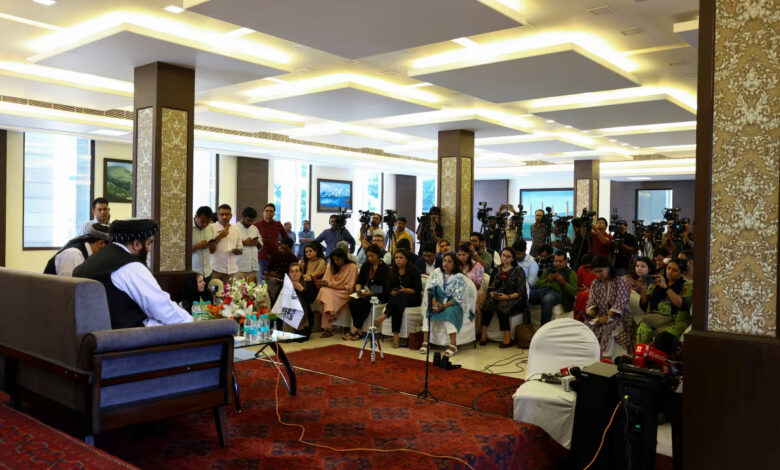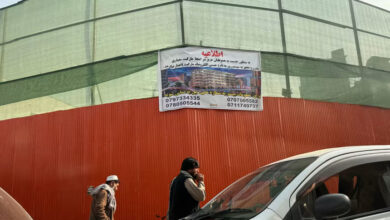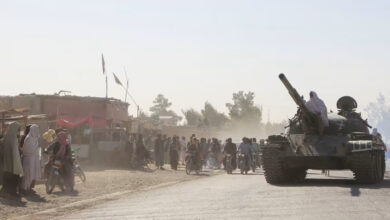
Three days after being excluded from a press conference fronted by Taliban’s foreign minister in India, women journalists took their seats in a powerful show of force to question him about the social exclusion of Afghan women.
An image from Reuters news agency shows Foreign Minister Amir Khan Muttaqi facing a row of women journalists inside the Afghan Embassy in Delhi on Sunday.
It was a rare audience for the Taliban minister representing an all-male government that over four years has slowly suffocated the freedoms and dreams of Afghan women and girls.
“Why are you doing this in Afghanistan? When will they be allowed to go back and get the right to education?” asked prominent independent journalist Smita Sharma.
Muttaqi’s week-long visit to India is the first foreign diplomatic trip by a top Taliban leader since the hardline Islamist group seized power in 2021.
The trip was seen as a reset of relations between Delhi and Kabul, part of the Taliban’s attempts to be accepted as a legitimate government.
Only men were invited to Muttaqi’s first news conference on Friday, which was described by many Indian reporters, press groups and opposition politicians as an affront to India’s democratic principles and press freedom.
The Press Club of India “strongly condemned” the exclusion of women journalists, and called on the Indian government to “ensure that no foreign power is permitted to dictate the terms of engagement with the Indian press.”
The Editors Guild of India called the decision “blatant gender discrimination on Indian soil.”
India’s Ministry of External Affairs (MEA) said it “had no involvement in the press interaction” held by the Afghan foreign minister, local media reported.
The government’s response only deepened the criticism that the world’s largest democracy was apparently capitulating to the Taliban, which has been diplomatically isolated over its treatment of women and girls.

“Our first response was obviously outrage. But the real thing we had hoped for was that the Indian government would at least criticize it and say something about it,” said Suhasini Haider, Diplomatic Editor for The Hindu newspaper, who attended the second press conference.
“It was also about a precedent, the idea that the Taliban’s representative — and it’s a government that’s not recognized by India — could come to Delhi and host a press conference without women, wouldn’t become a precedent for future interactions.”
Afghanistan’s ‘gender apartheid’
Afghanistan remains the only country in the world that prohibits girls and women from getting general education at secondary and higher levels. The government dictates how women must dress, where they can and cannot go, and with whom they must go – for example, they must have a male guardian with them to travel.
The ban is part of a wide-ranging crackdown on women’s rights by the Taliban, who UN groups and activists have accused of presiding over “gender apartheid.”
In July this year, the International Criminal Court sought arrest warrants for two of the top Taliban leaders, citing the persecution of women and girls as evidence of crimes against humanity.
In the Sunday press conference, foreign minister Muttaqi cited a “technical issue” to justify why women journalists were absent from the initial press event.
“It was organised on a short notice. (There was) a short list of journalists that were invited… It was more of a technical issue but there was no other problems,” Muttaqi told reporters. “Our colleagues had decided to send the invitation to a specific list of journalists. There were no other intentions other than that.”
Haider believes that public pressure following the first conference “really ignited something, and so it was really the Taliban that decided the bad press wasn’t worth it.”
Women journalists were invited inside the embassy alongside their male colleagues to ask questions and were not required to wear head coverings. Haider said they acknowledged there was no reason to have kept women out of the initial briefing.
In a “moment of media solidarity,” Haider said male reporters cleared the first few rows of the press conference for their female colleagues, so it was mostly women front and center.
Muttaqi faced hard questions as to why Afghan girls and women were barred from schools and the workforce.
“We have 10 million students attending schools and other educational institutes, of which, 2.8 million are women and girls. In religious seminaries, this educational opportunity is available all the way to the graduation levels – the highest levels,” Muttaqi responded.
The Taliban leader said, “there are certain limitations in specific parts, but that does not mean that we oppose education.”
Haider said the minister’s answers were “obviously very well-rehearsed lies.”
“We knew it for a fact, and yet he continued to repeat that statement,” she said.
Russia remains the only foreign government that has formally recognized the Taliban and diplomats have said steps toward recognition require a change of course on women’s rights.
Though India has upgraded diplomatic ties with Afghanistan, it is yet to recognize the Taliban government.
Analysts have said the Taliban’s high-level visit to India signals a change in ties, in part, as a counterbalance to souring relations with neighbor Pakistan.
After Muttaqi met Indian Foreign Minister Subrahmanyam Jaishankar Friday, India announced it would upgrade its diplomatic mission in Kabul to an embassy, which was closed when the Taliban recaptured Kabul in 2021.
The trip by the United Nations-sanctioned Muttaqi was only made possible after the UN Security Council granted him a travel waiver.
Haider said the visit was meant to normalize relations between the Taliban government and India.
“There are many very good reasons to engage the Taliban,” she said.
“The question is, how far are you willing to go down the path of normalization and the path of diplomatic upgradation, and then finally, recognition, before you feel your principles have been compromised?”




